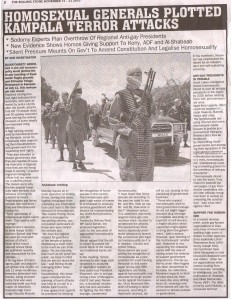If RenewAmerica has a Christmas party, I want to attend just to watch Jamie Freeze take on the good ol’ boys. Jamie is a young conservative woman and a student at Regent University law school who thinks the repeal of Don’t Ask, Don’t Tell is a good thing. Elsewhere, on the 17th, the ACLJ’s Jordan Sekulow essentially yawned at the repeal. I will discuss his WaPo column after I briefly excerpt Freeze’s article titled, “General George S. Patent Leather: Conservatives and DADT,” Freeze counters fellow Renew America columnist Bryan Fischer’s effort to link the lunar eclipse with the repeal of DADT.
Freeze is a traditional evangelical regarding sexuality but she does not believe government should require citizens to adopt her views. She says:
…as one Christian associate said, “For us to feel appointed to execute some sort of cosmic justice on the Lord’s behalf is the height of hubris.”
Our government governs Christians and non-Christians. America was founded on Christian principles by Christians and non-Christians. It was not an exclusively Christian nation or else the 1st Amendment would have been nullified from the start. Our founders quickly realized that mandating church attendance and tithing were futile attempts in changing the hearts of men. That is why the Baptists were the forerunners of separation of church and state in colonial America — they did not want a state church because God did not need the state to accomplish His plan. The state interfered with God’s work. As a Baptist, I am proud of the tradition that Isaac Backus and John Leland gave America, and I seek to preserve it.
I would add Roger Williams to the list as well. Williams and then later the early Baptists Backus and Leland stood for a state that protected the rights and conscience of all. I really like this quote attributed to Leland by Wikipedia:
“The notion of a Christian commonwealth should be exploded forever…Government should protect every man in thinking and speaking freely, and see that one does not abuse another. The liberty I contend for is more than toleration. The very idea of toleration is despicable; it supposes that some have a pre-eminence above the rest to grant indulgence, whereas all should be equally free, Jews, Turks, Pagans and Christians.” – A Chronicle of His Time in Virginia.
Freeze then addresses several arguments social conservatives have raised against DADT, in one case citing a soldier friend who believes sexual orientation is irrelevant to service. She adds that we need all hands on deck while fighting two wars and channels Barry Goldwater’s observation that people who shoot straight need not be straight.
In what has passed for conservatism in recent years, Freeze rightly notes that the divide over social issues is growing.
As a conservative, I have already received much criticism for the views expressed in this article, and I anticipate more. One man, a prominent local Republican clearly offended by my views, told me I held no claim to the ideology of conservatism. However, I will share with you what I told him: “If by conservative, you mean valuing life, liberty, and property above all other rights, then yes, I am conservative. I am a Lockean to the core. However, if, by conservative, you mean I want the government to mandate our lives to the smallest details all for the sake of public morality, then no, I am not a conservative.”
I agree with Freeze here but I do not dismiss the concerns of social conservatives lightly, especially those who are not working for advocacy groups. Many people I know are afraid that the government is going to make them believe things they can’t believe. They are afraid that the kind of philosophy espoused by Williams and Leland will require them to adhere to views they cannot accept. Not so. When laws are judged fairly, protecting the freedom of others does not remove mine. In a society where equal protection is for everyone, it is to my advantage to stick up for the rights of all. By doing this, I am sticking up for my rights to pursue my conscience as well. Where rights seem to be in conflict, we can try to work it out as citizens or involve the judiciary.
Another young conservative who has probably raised some eyebrows is Jordan Sekulow with the conservative ACLJ. Started by Pat Robertson, ACLJ does not have any pro-gay cred, and yet Mr. Sekulow writes, No DADT, No Problem:
The outdated, unworkable “Don’t Ask, Don’t Tell” law will likely be repealed in the next few days. As a Christian conservative broadcaster, attorney, and activist who recently discussed DADT and my opinion about it on-air, I can say that for the most part, social conservatives are not enraged about the end of DADT. In fact, the grassroots has not been engaged on this issue for a long time.
I feel pretty sure that the Family Research Council or the American Family Association will not agree with this assessment since they have been on a full court press to stop the repeal. Sekulow locates his attitude at least partially in his youth, saying
We live in a new time. As a young member of the “religious right,” if a gay friend or family member came to me and said they wanted to join the military, I would gladly be the first to congratulate and thank them. I do not believe they should be barred from serving because of their sexual orientation.
For all those who believe social conservatism is a monolithic mass, one needs to contrast Sekulow’s statement with Bryan Fischer’s “homosexuals in the military gave us six million dead Jews” rant.
I do not want to make too much out of two young conservatives and their views on DADT, but I am inclined to think they are part of what other observers see as a moderating trend among youth toward homosexuality. These young people do not view homosexual behavior as an option within their religious views, but they also seem to be rejecting the strident, stereotyping rhetoric and policies of their elders.

